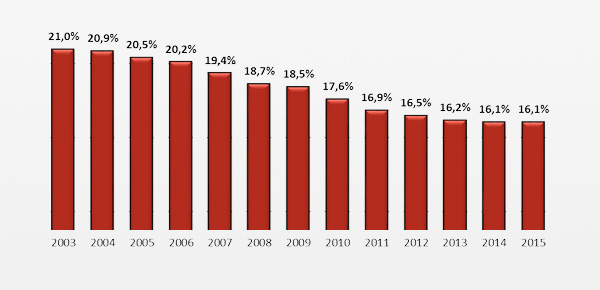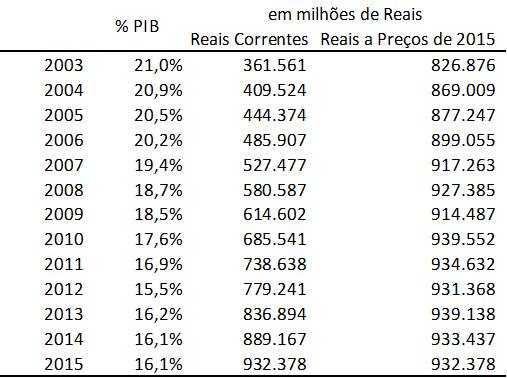Underground economy stops decreasing for the first time in 12 years

ETCO and FGV / IBRE study reveals that, after a long period of contraction, the informal market stops and moves the equivalent to 16,1% of the Brazilian GDP
Sao Paulo, November 30 of 2015 - The Underground Economy Index (IES), released today (25) by the Brazilian Institute of Ethics in Competition (ETCO), together with the Brazilian Institute of Economics of the Getúlio Vargas Foundation (FGV / IBRE), showed that the informal market moved R $ 932 billion in 2015. This value represents 16,1% of the country's Gross Domestic Product (GDP), exactly the same percentage obtained in 2014. It is the first time since 2003, the first year of the index estimate, in which there was no percentage reduction of the informal market.
The conclusion is that the stagnation in the informality index results from the economic recession and political instability. “Much more than an indicator, the number shows a market trend. The forecast for the coming years is for a change in the scenario with growth of the informal market. Indicators such as the increase in inflation and unemployment and the difficulty in accessing credit hinder the reduction of this market. ”, Analyzes Samuel Pessoa, a researcher at FGV / IBRE.
In absolute values and updated prices, the underground economy moved R $ 932 billion in 2015. Last year, this value totaled R $ 889 billion. This amount corresponds to the entire production of goods and services not deliberately reported to the government, which, therefore, is not included in the national GDP.
In the last 12 years, the index fell 4,9 percentage points, and with the exception of 2009, the year in which the country was also in recession, there were drops of 0,7 pp from 2006 to 2011, a period in which the HEI went from 20,2% to 17%. Between 2012 and 2014, the slowdown began, a direct consequence of the sharp drop in the number of formal hires by the industry and growth in the service sector, which has higher levels of informality than the industry. This is the first year in which there is no change in the percentage of informality - the index maintains the 16,1% presented in 2014.
“ETCO's role is to strengthen measures that reinforce competitive ethics and that help in predicting the business environment. The Institute is focused on combating the transgressions that plague the economy and business activity, resulting mainly from tax issues and regulatory activity. ” says Evandro Guimarães, Executive President of ETCO.
What is certain is that informality brings direct damage to society, creates an environment of transgression, stimulates opportunistic economic behavior, with a drop in the quality of investment and a reduction in the growth potential of the Brazilian economy. In addition, it causes a reduction in government resources for social programs and investments in infrastructure.
About the Shadow Economy Index
ETCO believes that knowing the size of the problem is critical to tackling it. Much is said, but little is known, about informality, piracy and evasion, as, as illegal activities, they are difficult to measure. The ETCO, in conjunction with the Brazilian Institute of Economics of the Getúlio Vargas Foundation (FGV / IBRE), has been publishing since 2007 the Underground Economy Index, a study that estimates the values of activities deliberately not declared to public authorities, with the objective of evading taxes, and those of those who find themselves in the informal sector due to excessive taxation and bureaucracy.





